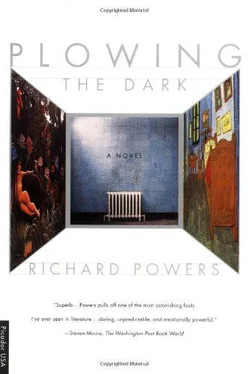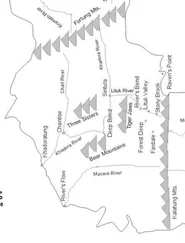Signs of human life abound. A bitten apple hides amid the pile rotting at the foot of a tree. An abandoned bucket, half full, slops its squiggles of water. A bent rag doll sits compliant on a bench. A kite tied to a picket fence floats ripe for unleashing.
But this world leaves no trace of its makers. No people populate the Crayon Room. It is a simple place, pristine, prelapsarian. Curls of smoke craze up from the crippled chimney of one little summer cottage, too cozy for habitation. Behind gapped, sashed windows, a crayon cat purrs, fixed on a goldfish that darts against its rough-hewn bowl.
The Crayon World is a proud mother's gallery, the first retrospective refrigerator-magnet show of a budding child genius. But nothing here looks much like what it stands for. Only the conventions of a house, the insanely pitched roof, the burnt sienna front door lolling on its hinge. The code for cat and apple and bucket and tree and abandoned doll.
Visitors here face down their own ghostliness. The casual walker collides against nothing. Try to climb a hill, and you pass right through it. Hedgerows serve as mere suggestions. Approached, their bushes swell in detail, swimming toward the eye until they fill it. Then, with an optical pop, they vanish, freeing the scrawled grazing lands beyond them.
Now and then, an eagle shrills, invisible. Otherwise, silence, save for the gurgle of a hidden stream and, down in the gardens, the drone of the loosened hive. Circlets of scissored medallions buzz freely, in skittish digital trajectories, each striped with the icon for honeybee. Their randomly cycled rasp, the sound of fidget flight, stands in for the beating of insect wings.
A wheelbarrow in scarlet wax sits tilted on a path somewhere down a projected dell. The pasture is plain and the woods a welcoming cartoon. This mad perspective, drifting between dimensions, is perfect for getting lost in.
The Crayon World feels bigger than it is. Its space is curved. It wraps back onto itself. Hikers strike out to the southwest, into a weald of clumsy flowering horse chestnuts. The stroll unrolls, always a new copse in front of you. The hike moseys on, furlong stretching into mile, mile into league, for crayon measures conform to the lost imperial units of bedtime enchantment.
Sky blue drops to Prussian, then to a darker cobalt. And still, ever more southwest stretches out in front of you. More than when you started. Your walk in the woods threatens to turn into a panicked sprint. Then the crayon receptors at the edge of your retina say wait: that tree is wrong. That tree shouldn't be here. And in that mental crossing where scribbles synapse against words, you wonder: Where have I seen that thing before?
Sure enough, in a ridiculously few steps, the tree returns. It looms up from the same speck on the same compass point, without your shifting tack. It zooms to the same height as you draw close. It bares the same rift down the middle of its data. Even before you can wonder how you missed it, the trail loops and the whole scene recycles.
The wand you use to wend through this wilderness has a knob for leaving breadcrumbs. But as in all such worlds, the crumbs attract a murder of crayon crows that devour your trail markers the moment you lay them down. All your wax signs will not guide you for more than a virtual minute. The path is past preserving, and the crayon adventure knows no goal except itself. The Crayon World is just a broad-stroked test. The test of how to enter it, and walk back out intact.
When rage reprised itself, when you fell back again on the old bitter tit for tat, when the need to escape finally left you throwing darts at the world map, at last it hit you. Simple choice: replay the old routine, the self-triggering cycle of accusations, the verbal razor cuts daubed in love's alcohol. Traipse down the path of tender sadomasochism yet one more soul-shredding time. Or turn around and walk. Escape down the path that must still lie somewhere to the south, the way you walked in.
One more tearful reconciliation would only further demean you both. The place you pushed for — the tumbledown house in the country, your dream of intimacy that always made her bite in fear — vanishes now into fantasy. It gives way to that darker late-night venue, where hisses of desire shade off into abuse, abuse feeding back into desire.
You've been each other's shared addiction, slinking back repeatedly to the nightmare rush that you've both fought to be rid of. you've come back from the dead a dozen times, only to spin out again, worse, for whole weeks at a time. You've suffered the delirium of total withdrawal: one month, two, without so much as a word. Then, clean, virginal, at peace, calling again, just to see if you can. Just to see who's in charge. Just a quick little needle slipped into one another's waiting veins.
All that changes forever, this Friday. You're off to a place where you can't ask her to hurt you again, where neither of you can backslide into care. Where you can no longer reach one another, however much mutual tenderness revives. It rocks you, just to imagine.
Among your friends, the plan produces only stunned hilarity. "You're going where? Don't they shoot people in the street there, without even asking whose side they're on?"
"No," you shit them back. "You're thinking of D.C." At last they realize, these friends who've witnessed your worst whiplash for years now. You mean it, and it blows them away.
You rush to assure everyone. The school you'll teach for is a virtual armed compound. Tensions are nowhere near what they were this time last year. The civil war is ending; all sides are talking compromise. The foreign armies have left. Their president has finally taken the reins. All that old insanity is a thing of the past.
And it's only for two terms, anyway. Eight months. Safer than a daily commute on the Edens Expressway.
You sleep well on the long flight, crushed up against the window with one of those squares of cotton gauze the stewardesses pass off as pillows. In your sleep, you already speak fluent Arabic. Even your dream marionette is struck by the strangeness: these guttural rapid bursts issuing from you, part nonsense, part gift of tongues.
Over the cabin speakers, the pilot warns that he must take the standard evasive maneuvers upon approach. Passengers are not to panic. The plane will simply lose a few thousand feet in a matter of seconds. Many on board seem used to the procedure.
You Stuka to a landing, safe, even exhilarated. The guard at the baggage claim totes a machine gun resembling an haute couture coat hanger. The school bursar is waiting in the terminal to meet you. The metropolis lies dark and quiet. You cock your ears toward the south suburbs, but can hear nothing except traffic. The chauffeur from the school laughs: What did you expect? Grenade-toting crazies lurking behind every street vendor?
In the morning, you tour the compound. The school buildings are mostly intact. They sit up on a bluff, with a view down to the Corniche and the sea beyond. Your office balcony looks out on precarious pyramids of rubble being bulldozed into the water. You search for the Green Line, the vegetation growing up through the cracked concrete that divides the city. You see only a stand of high-rises, their pockmarks blending into this day's dappled shadows.
It's better than you imagined. All white and marine and accepting. A recovering place. A good place to recover. The resinous air, the olive mountains. Arid, azure, clear. Your sinuses haven't been this open since childhood. This city is returning. You can live here.
And as with all key conclusions you've reached in your thirty-three years, you're wrong.
She could not leave that room as easily as she entered. The Little Italy that Adie Klarpol flew back to now seemed a nostalgic, second-rate Bellows or Marsh. One visit to that high-tech wonderland and her old urban cityscape collapsed into back projection. Her friends shrank to animated sprites; her daily obligations, items to be clicked through with the wave of a wand.
Читать дальше












